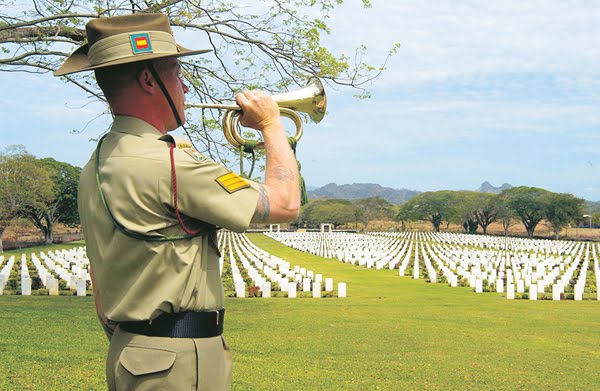The History of “Taps” Bugle Music Narrated by John Wayne

This is a repost featuring the History of “Taps” narrated by John Wayne.
Be sure to dwell on the words that are often overlooked when we hear the bugle version.
The history of the bugle call “Taps” was recorded by John Wayne and is now available as an audio narration of a mostly static video slide set on the YouTube video featured below.
The solemn bugle musical piece goes back over a hundred and fifty years.
This “end of day” or “lights out” signal quickly became a tribute to fallen comrades in the Civil War has endured to this day as a means of honoring, mourning, and remembering those in our military who are prepared to or who already have given their lives in service to the rest of us who have enjoyed enduring freedom because of their service.
I think you’ll agree that Taps captures perfectly the essence of the solemnity of the occasions of loss with which it is so widely associated.
Original Lyrics
There is one original set of lyrics meant to accompany the music, written by Horace Lorenzo Trim:
Day is done, gone the sun
From the lakes, from the hills, from the skyAll is well, safely restGod is nigh.
Fading light dims the sightAnd a star gems the sky, gleaming brightFrom afar, drawing nearFalls the night.
Thanks and praise for our daysNeath the sun, neath the stars, neath the skyAs we go, this we know
God is nigh.
Other variants have also appeared over the years.
History of Taps
By Rod Powers
Of all the military bugle calls, none is so easily recognized or more apt to render emotion than Taps. Up to the Civil War, the traditional call at day’s end was a tune, borrowed from the French, called Lights Out. In July of 1862, in the aftermath of the bloody Seven Days battles, hard on the loss of 600 men and wounded himself, Union General Daniel Adams Butterfield called the brigade bugler to his tent. He thought “Lights Out” was too formal and he wished to honor his men.
Oliver Wilcox Norton, the bugler, tells the story, “…showing me some notes on a staff written in pencil on the back of an envelope, (he) asked me to sound them on my bugle. I did this several times, playing the music as written. He changed it somewhat, lengthening some notes and shortening others, but retaining the melody as he first gave it to me. After getting it to his satisfaction, he directed me to sound that call for Taps thereafter in place of the regulation call. The music was beautiful on that still summer night and was heard far beyond the limits of our Brigade. The next day I was visited by several buglers from neighboring Brigades, asking for copies of the music which I gladly furnished. The call was gradually taken up through the Army of the Potomac.”
This more emotive and powerful Taps was soon adopted throughout the military. In 1874 It was officially recognized by the U.S. Army. It became standard at military funeral ceremonies in 1891. There is something singularly beautiful and appropriate in the music of this wonderful call. Its strains are melancholy, yet full of rest and peace. Its echoes linger in the heart long after its tones have ceased to vibrate in the air.
The origin of the word “Taps” is thought to have come from the Dutch word for “Tattoo”- “Taptoe.” More than likely, “Taps” comes from the the three drum taps that were played as a signal for “Extinguish Lights” when a bugle was not used. As with many other customs, the twenty-four notes that comprise this solemn tradition began long ago and continue to this day.
While there are no official lyrics for Taps, the following unofficial verse (author unknown) is often used:
Fading light dims the sight,And a star gems the sky, gleaming bright.From afar drawing nigh — Falls the night.
Day is done, gone the sun,From the lake, from the hills, from the sky;All is well, safely rest, God is nigh.
Then good night, peaceful night,Till the light of the dawn shineth bright;God is near, do not fear — Friend, good night.
Above Information Courtesy of United States Army Center for Military History
Etc.
Please use the Share Buttons and/or email the post link below directly to your friends. They may be as surprised as you to learn “the story behind the story”.
The History of “Taps” Bugle Music Narrated by John Wayne
Thanks. I appreciate it. – Dick S

